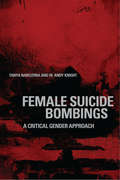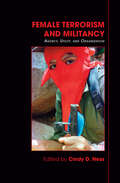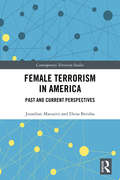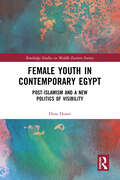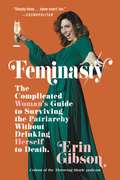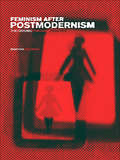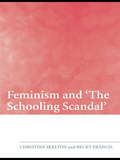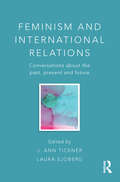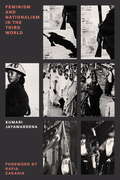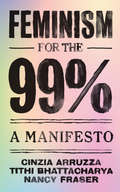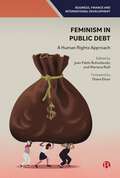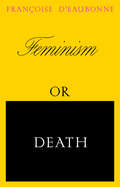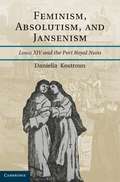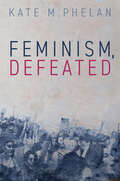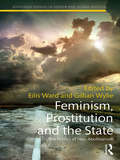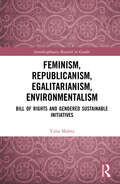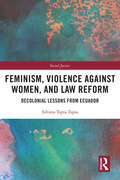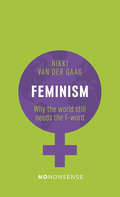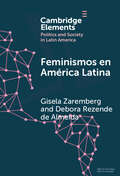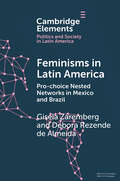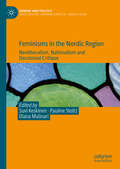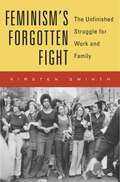- Table View
- List View
Female Suicide Bombings: A Critical Gender Approach
by Tanya Narozhna W. Andy KnightAs media coverage of terrorism and terroristic acts has increased so too has the discussion about the identities, motives, and gender of the perpetrators. Over the past fifteen years, there have been over 150 reported suicide bombings committed by women around the world. Because of its prominence in media reporting, the phrase "female suicide bomber" has become loaded with gendered notions and assumptions that elicit preconditioned responses in the West. Female Suicide Bombings critically examines and challenges common assumptions of this loaded term. Tanya Narozhna and W. Andy Knight introduce female suicide bombings as a socio-political practice and a product of deeply politicized, gendered representations. Drawing on a combination of feminist and post-colonial approaches as well as terrorism studies literature, the authors seek to transcend ideological divisions in order to enhance our understanding of how gender, power, and academic practices influence our perceptions of female suicide bombings.
Female Terrorism and Militancy: Agency, Utility, and Organization (Contemporary Terrorism Studies)
by Cindy D. NessThis edited volume provides a window on the many forces that structure and shape why women and girls participate in terrorism and militancy, as well as on how states have come to view, treat, and strategize against them. Females who carry out terrorist acts have historically been seen as mounting a challenge to the social order by violating conventional notions of gender and power, and their participation in such acts has tended to be viewed as being either as a passive victim or a feminist warrior. This volume seeks to move beyond these portrayals, to examine some of the structuring conditions that play a part in a girl or woman’s decision to commit violence. Amidst the contextual factors informing her involvement, the volume seeks also to explore the political agency of the female terrorist or militant. Several of the articles are based on research where authors had direct contact with female terrorists or militants who committed acts of political violence, or with witnesses to such acts.
Female Terrorism in America: Past and Current Perspectives (Contemporary Terrorism Studies)
by Jonathan Matusitz Elena BerishaThis book provides a comprehensive analysis of female terrorism in America, both past and present. The volume takes a fresh look at women’s actions of left-wing political violence, right-wing political violence, and religious extremist violence (among others). It also examines the multitude of roles that women have played over the past few decades in such organizations (including leadership positions and more passive roles)—not to mention the diverse methods of recruitment, radicalization, and propaganda. The objective of this book is to examine—using a wide range of case studies, facts, statistics, and theoretical methodologies—how collective or personal factors have influenced or reinforced the actions that these women take. Government agencies continue to underestimate the ability of women to support and perpetrate terrorism. As such, the United States is facing a wholly inaccurate and incomplete picture of the complexities of domestic terrorism, and this is contributing to a serious neglect of the issue at the national level. This volume ultimately aims to offer policy-relevant solutions to decrease the threat of domestic female political violence in the United States. Female Terrorism in America will be of much interest to students of terrorism and political violence, American politics, gender studies, and sociology.
Female Youth in Contemporary Egypt: Post-Islamism and a New Politics of Visibility (Routledge Studies in Middle Eastern Society)
by Dina HosniBased on interview material, observations and content analysis, this book captures the everyday life structures of a cohort of Muslim/ex-Islamist female youth in Egypt who have joined or established new networks that share the common interest of doing ‘good’ to the society based on their religious worldviews, representing a broader societal movement. Female Youth in Contemporary Egypt posits that despite the fact that the 2011 Egyptian uprisings did not necessarily materialize with the political effects anticipated by some of its activists, it seems to have led to the formation of a new generation of active youth with a distinct worldview. Four broad and intertwined theoretical considerations have been taken into account. First, the book delineates the emergence and continuous development of post- (and sometimes non-) bourgeois public spheres in Arabo-Islamic contexts and conceptualizes multiple publics of overlapping Islamic structures rather than one Islamic public. Second, it offers an empirical as well as a conceptual understanding of the positioning of religion as public/private. Third, it presents a critique of Islamist thought conducive to the rise of post-Islamism; and fourth it offers a critique of feminist thought to throw light on novel forms of Muslim women's discourses and activism in line with post-Islamist worldviews. This book will be of interest to scholars in Middle Eastern Studies, women’s studies, and political studies.
Feminasty: The Complicated Woman's Guide to Surviving the Patriarchy Without Drinking Herself to Death
by Erin GibsonFrom the wickedly famous and feminist creator and host of the "Throwing Shade" podcast, a collection of hilarious personal essays and political commentary perfect for fans of Lindy West and Roxane Gay. Since women earned the right to vote a little under one hundred years ago, our progress hasn't been the Olympic sprint toward gender equality first wave feminists hoped for, but more of a slow, elderly mall walk (with frequent stops to Cinnabon) over the four hundred million hurdles we still face. Some of these obstacles are obvious-unequal pay, under-representation in government, reproductive restrictions, lack of floor-length mirrors in hotel rooms. But a lot of them are harder to identify. They're the white noise of oppression that we've accepted as lady business as usual, and the patriarchy wants to keep it that way.Erin Gibson has a singular goal-to create a utopian future where women are recognized as humans. In FEMINASTY-titled after her nickname on the hit podcast "Throwing Shade"-she has written a collection of make-you-laugh-until-you-cry essays that expose the hidden rules that make life as a woman unnecessarily hard and deconstructs them in a way that's bold, provocative and hilarious. Whether it's shaming women for having their periods, allowing them into STEM fields but never treating them like they truly belong, or dictating strict rules for how they should dress in every situation, Erin breaks down the organized chaos of old fashioned sexism, intentional and otherwise, that systemically keeps women down.
Feminism
by Nancy DziedzicThis book is one volume of the highly acclaimed Opposing Viewpoints Series developed by Greenhaven Press focusing on feminism.
Feminism After Postmodernism?: Theorising Through Practice
by Marysia ZalewskiHighly original and stimulating, this book provides a detailed overview of postmodern feminist theory and practice. Subjects covered include:*the differences between the feminism of the 1970s and contemporary feminism*liberal, radical, socialist and postmodern feminisms*feminist reactions to the growth in reproductive technologies*how feminism informs debates about the subject, epistemology and political action*feminism into the new millennium
Feminism against Progress
by Mary HarringtonModern feminism increasingly benefits only a small class of professional women. There is no reason to sacrifice everyone else's happiness for their sake.Mary Harrington shows that women's liberation was less the result of moral progress than an effect of the material consequences of the Industrial Revolution. We've now left the industrial era for the digital age, in which technology is liberating us from natural limits and embodied sex differences. This shift may benefit the elites, but it also makes it easier to commodify women's bodies, human intimacy, and female reproductive abilities. "Feminism" has been captured by well-off white-collar women, who use it to advance their own economic and political interests under the pretense that these are the interests of all women—all the while wielding the term like a club against anyone, male or female, who dissents. Feminism against Progress is a stark warning against a dystopian future in which poor women become little more than convenient sources of body parts to be harvested and wombs to be rented by the rich. "Progress" no longer benefits the majority of women, and only a feminism that is skeptical of it can truly defend their interests in the twenty-first century.
Feminism and 'The Schooling Scandal'
by Christine Skelton Becky FrancisFeminism and ‘The Schooling Scandal’ brings together feminist contributions from two generations of educational researchers, evaluating and celebrating the field of gender and education. The focus throughout is on the years of compulsory schooling, examining key concepts in gender and education identified and developed by international thinkers in educational feminism. Topics covered include: social class, ethnicity and sexuality in relation to experiences in school; theories and methodologies for understanding gender; pedagogy and practice in education; and the direction of educational policy and the ‘problem of boys’. Providing a comprehensive overview of contemporary research and theory emerging from ‘second wave’ feminism and assessing their impact on pupils and teachers in today’s schools and classrooms, this book forms essential reading for anyone studying gender and education.
Feminism and International Relations: Conversations about the Past, Present and Future
by Laura Sjoberg J. Ann TicknerFeminist International Relations scholarship in the United States recently celebrated its 20th anniversary. Over those years, feminist researchers have made substantial progress concerning the question of how gender matters in global politics, global economics, and global culture. The progress has been noted both in the academic field of international relations and, increasingly, in the policy world. Celebrating these achievements, this book constructs conversations about the history, present state of, and future of feminist International Relations as a field across subfields of IR, continents, and generations of scholars. Providing an overview and assessment of what it means to "gender" IR in the 21st century, the volume has a unique format: it features a series of intellectual conversations, presenting cutting-edge research in the field, with provocative comments from senior scholars. It examines issues including global governance, the United Nations, war, peace, security, science, beauty, and human rights and addresses key questions including: What does viewing the diverse problems of global politics through gendered lenses look like in the 21st Century? How do feminisms accommodate differences in culture, race, and religion? How do feminist theoretical and policy analyses fit together? These conversations about feminist IR are accessible to non-specialist audiences and will be of interest to students and scholars of Gender Studies, Feminist Politics and International Relations.
Feminism and Nationalism in the Third World
by Rafia Zakaria Kumari JayawardenaA founding text of transnational feminismFor twenty-five years, Feminism and Nationalism in the Third World has been an essential primer on the late nineteenth- and early twentieth-century history of women's movements in Asia and the Middle East. In this engaging and well-researched survey, Kumari Jayawardena presents feminism as it originated in the Third World, erupting from the specific struggles of women fighting against colonial power, for education or the vote, for safety, and against poverty and inequality. Journalist and human rights activist Rafia Zakaria's foreword to this new edition is an impassioned letter in two parts: the first to Western feminists; the second to feminists in the Global South, entreating them to use this "compendium of female courage" as a bridge between women of different nations.Feminism and Nationalism in the Third World was chosen as one of the top twenty Feminist Classics of this Wave, 1970-1990, by Ms. magazine, and won the Feminist Fortnight Award in the UK.From the Trade Paperback edition.
Feminism and the Abyss of Freedom
by Linda M. ZerilliIn contemporary feminist theory, the problem of feminine subjectivity persistently appears and reappears as the site that grounds all discussion of feminism. In Feminism and the Abyss of Freedom, Linda M. G. Zerilli argues that the persistence of this subject-centered frame severely limits feminists' capacity to think imaginatively about the central problem of feminist theory and practice: a politics concerned with freedom. Offering both a discussion of feminism in its postmodern context and a critique of contemporary theory, Zerilli here challenges feminists to move away from a theory-based approach, which focuses on securing or contesting "women" as an analytic category of feminism, to one rooted in political action and judgment. She revisits the democratic problem of exclusion from participation in common affairs and elaborates a freedom-centered feminism as the political practice of beginning anew, world-building, and judging. In a series of case studies, Zerilli draws on the political thought of Hannah Arendt to articulate a nonsovereign conception of political freedom and to explore a variety of feminist understandings of freedom in the twentieth century, including ones proposed by Judith Butler, Monique Wittig, and the Milan Women's Bookstore Collective. In so doing, Zerilli hopes to retrieve what Arendt called feminism's lost treasure: the original and radical claim to political freedom.
Feminism for the 99%: A Manifesto
by Nancy Fraser Cinzia Arruzza Tithi BhattacharyaNamed one of Vogue’s “Most Anticipated Books of 2019” <P><P>This is a manifesto for the 99 percent <P><P>Unaffordable housing, poverty wages, inadequate healthcare, border policing, climate change—these are not what you ordinarily hear feminists talking about. But aren’t they the biggest issues for the vast majority of women around the globe? <P><P>Taking as its inspiration the new wave of feminist militancy that has erupted globally, this manifesto makes a simple but powerful case: feminism shouldn’t start—or stop—with the drive to have women represented at the top of their professions. It must focus on those at the bottom, and fight for the world they deserve. And that means targeting capitalism. Feminism must be anticapitalist, eco-socialist and antiracist.
Feminism in Public Debt: A Human Rights Approach (Business, Finance and International Development)
by Diane Elson Julieta Rossi Diane Perrons Lena Lavinas Ariel Wilkis Christina Laskaridis Penelope Hawkins Laura Pautassi Iolanda Fresnillo Alicja Paulina Krubnik Marina Zucker Marques Francisco Cantamutto Agostina Constantino Patricia Miranda Camila Villar Duran Maria Nieves Rico Corina Rodríguez Enriquez Florencia Paternio Verónica Serafini Geoghegan Flavia Marco Navarro Leia Achapong Ulrike Marx Dorothy Estrada Tanck María Cristina Perceval Magalí BrosioEPDF and EPUB available open access under CC-BY-NC-ND licence. As many developing countries are facing increasingly higher levels of debt and economic instability, this interdisciplinary volume explores the intersection of sovereign debt and women's human rights. Through contributions from leading voices in academia, civil society, international organizations and national governments, it shows how debt-related economic policies are widening gender inequalities and argues for a systematic feminist approach to debt issues. Offering a new perspective on the global debt crisis, this is an invaluable resource for readers who seek to understand the complex relationship between economics and gender.
Feminism or Death: How the Women's Movement Can Save the Planet
by Francoise d'EaubonneThe passionately argued, incendiary French feminist work that first defined &“eco-feminism&”—now available for the first time in English Originally published in French in 1974, radical feminist Francoise d&’Eaubonne surveyed women&’s status around the globe and argued that the stakes of feminist struggle was not about equality but about life and death—for humans and the planet. In this wide-ranging manifesto, d&’Eaubonne first proposed a politics of ecofeminism, the idea that the patriarchal system's claim over women's bodies and the natural world destroys both, and that feminism and environmentalism must bring about a new &“mutation&”—an overthrow of not just male power but the system of power itself. As d&’Eaubonne prophesied, &“the planet placed in the feminine will flourish for all.&” Never before published in English, and translated here by French feminist scholar Ruth Hottell, this edition includes an introduction from scholars of ecology and feminism situating d&’Eaubonne&’s work within current feminist theory, environmental justice organizing, and anticolonial feminism.
Feminism, Absolutism, and Jansenism
by Daniella KostrounFeminism, Absolutism, and Jansenism chronicles seventy years of Jansenist conflict and its complex intersection with power struggles between gallican bishops, Parlementaires, the Crown and the Pope. Daniella Kostroun focuses on the nuns of Port-Royal-des-Champs, whose community was disbanded by Louis XIV in 1709 as a threat to the state. Paradoxically, it was the nuns' adherence to their strict religious rule and the ideal of pious, innocent and politically disinterested behavior that allowed them to challenge absolutism effectively. Adopting methods from cultural studies, feminism and the Cambridge School of political thought, Kostroun examines how these nuns placed gender at the heart of the Jansenist challenge to the patriarchal and religious foundations of absolutism; they responded to royal persecution with a feminist defense of women's spiritual and rational equality and of the autonomy of the individual subject, thereby offering a bold challenge to the patriarchal and religious foundations of absolutism.
Feminism, Defeated
by Kate M. PhelanFeminism has been defeated.Once a politics, feminism is now a philosophy, an epistemology, a method. Once for women, it is now for everyone. Once in pursuit of liberation, it now seeks only inclusion.In Feminism, Defeated, Kate Phelan traces the depoliticization and ultimately, the defeat of feminism. She recovers the second-wave view of men and women as sex-classes, enemies, political kinds, a view more radical than the contemporary view of men and women as social constructs. She also describes how poststructuralism displaced this view and replaced it with another. In this view, the sex/gender binary constructs men and women, and excludes the gender nonconforming.As this view replaced the second-wave one, the injustice of men’s oppression of women was replaced by that of exclusion, and the goal of women’s liberation was replaced by that of inclusion. Thus did feminism become the trans-inclusionary movement as which we now know it, and Phelan shows that this shift was not the progression of feminism; it was the betrayal of it. In this highly original and persuasive study, she argues that the recent emergence of a new gender-critical feminism presents a moment of opportunity to reclaim feminism’s political project.
Feminism, Prostitution and the State: The Politics of Neo-Abolitionism (Routledge Studies in Gender and Global Politics)
by Gillian Wylie Eilis WardThis edited volume focuses on charting the rise of neo-abolitionism and offering a critique of the idea, its logics and consequences. A model of state policy which aims to abolish prostitution through legislation, Neo-abolitionism criminalises the buyer of sex but not the seller. It is currently law in Sweden and other Nordic states and dominates the framing of policy debates in many other Western liberal contexts. Pressure for adoption of this policy has come from radical feminists who understand prostitution and sex trafficking as a form of violence against women. This volume argues that this convergence between radical feminism and state’s interests arises from the emergence of, on the one hand, ‘governance feminism’ which seeks to have its ideals implemented through ‘top-down sovereigntist means’, and on the other hand, state’s interests in legitimising stricter border controls and law enforcement responses in relation to transnational organised criminality, ‘illegal’ migration, and security. Based around a series of country case studies each chapter will explore the politics surrounding the emergence of neo-abolitionism and its trajectory through those polities, whether the paradigm has been adopted, rejected or is still under debate. The volume will be of great interest to students and scholars of Social and Public Policy, Gender and Women’s Studies, Politics and International Relations and Critical Legal Studies/Criminology.
Feminism, Republicanism, Egalitarianism, Environmentalism: Bill of Rights and Gendered Sustainable Initiatives (Interdisciplinary Research in Gender)
by Yulia MaletaThis book addresses hegemonic ruling class masculinity and emphasized femininity within renewables organisational governance, and critiques Anglo-Celtic male privilege, as a barrier to women’s leadership participation. Primarily using the Australian socio-political context, the author considers the patriarchal control of organisations and renewables governance, and argues that women-led emphasized femininity-resistance strategies can challenge the hegemonic status of ruling elites to create a leadership that is less power oriented, more collaborative and open to change. Utilising detailed interviews with Australian women environmentalists, together with feminist, sociological and social movement theory, whilst considering the historic context of Red Vienna and contemporary political challenges (Brexit, Monarchism etc.), it puts forward an innovative policy framework for an Australian Bill of Rights Act and republican constitutional change. Written for academics, activists and policymakers alike, this book offers a unique insight into women’s inequity within patriarchal institutionalist governance. It will be engaging and inspiring reading for feminist and environmentalist activists and practitioners, in addition to professional associations focussing on gender, justice and environmental change. Academics and postgraduates in Gender Studies, Ecofeminism, Sociology and Organisational Studies will also find the book of key interest in its interdisciplinary discussions of Sustainable Scientific-Technological Development Initiatives (SSTDI) and feminism in an Australian political context.
Feminism, Violence Against Women, and Law Reform: Decolonial Lessons from Ecuador (Social Justice)
by Silvana Tapia TapiaOffering an important addition to existing critiques of governance feminism and carceral expansion based mainly on experiences from the Global North, this book critically addresses feminist law reform on violence against women, from a decolonial perspective. Challenging the consensus that penal expansion is mainly associated with the co-option of feminist campaigns to counteract violence against women in the context of neoliberal globalisation, this book shows that long-standing colonial narratives underlie many of today’s dominant legal discourses justifying criminalisation, even in countries whose governments have called themselves "leftist" and "post-neoliberal". Mapping the history of law reform on violence against women in Ecuador, the book reveals how the conciliation between feminist campaigns and criminalisation strategies takes place through liberal legality, the language of human rights, and the discourse of constitutional guarantees, across the political spectrum. Whilst human rights make violence against women intelligible in mainstream legal terms, the book shows that the emergence of a "rights-based penality" produces a benign, formally innocuous criminal law, which can be presented as progressive, but in practice reproduces colonial and postcolonial paradigms that limit and reshape feminist demands. The book raises new questions on the complex social and political factors that impact on feminist law reform projects, as it demonstrates how colonial assumptions about gender, race, class, and the family remain embedded in liberal criminal law. This theoretically and empirically informed analysis makes an innovative contribution to feminist legal theory, post-colonial studies, and criminal law; and will be of interest to activists, scholars and policymakers working at the intersections between gender equality, law, and violence in Latin America and beyond.
Feminism: Why the world still needs the F-word
by Nikki van der GaagFar from being in a "post-feminist" age we've seen recently a resurgence of feminist campaigning among women (and some men). There's a new brand of feminism: young, social-media savvy, militant. But there's a new kind of backlash, driven by so-called fundamentalists and by increasingly overt misogyny.This book gives a unique international perspective to the advances and challenges worldwide.
Feminismos en América Latina: Redes anidadas por el derecho al aborto en México y Brasil (Elements in Politics and Society in Latin America)
by Gisela Zaremberg Debora Rezende de AlmeidaEste Element analiza las características de los movimientos feministas actuales en América Latina y sus respuestas a las reacciones conservadoras. Para ello, nos enfocamos específicamente en el movimiento proaborto frente al contramovimiento antiaborto en México y Brasil. Para analizar los efectos potenciales de los movimientos ofrecemos un enfoque relacional que abarca tanto la dinámica dentro del propio campo feminista, como entre el feminismo y el estado. En primer lugar, proponemos el concepto de redes feministas anidadas. Las redes anidadas comprenden tres dimensiones que revelan la pluralidad del movimiento a través de: cuestiones interseccionales y de identidad sexual (dimensión horizontal), de su relación con el estado multifacético (vertical) y de la intermediación de los partidos políticos y las instituciones participativas en esta relación (intermedia). En segundo lugar, argumentamos que las redes anidadas permiten a las feministas tanto habilitar políticas como bloquear acciones de los conservadores. En resumen, exploramos cómo las feministas, aprovechando su pluralidad interna y su conexión con el estado, pueden contrarrestar los ataques conservadores.
Feminisms in Latin America: Pro-choice Nested Networks in Mexico and Brazil (Elements in Politics and Society in Latin America)
by Gisela Zaremberg Débora Rezende de AlmeidaThis Element analyzes the features of current feminist movements in Latin America and their responses to conservative reactions. For this, it focuses on the pro-choice movement vis-à-vis the anti-abortion countermovement in Mexico and Brazil. It offers a relational approach embracing the dynamics within the feminist field and between feminism and the state to capture the movements' potential effects. First, the Element proposes the concept of nested feminist networks, which comprises of three dimensions revealing the plurality of the movement across intersectional and sexual identity issues (horizontal), its relationship with the multifaceted state (vertical), and the intermediation of political parties and participatory institutions in this relationship (intermediary). Second, it argues that nested networks allow feminists to enable policies and block actions from conservatives. In sum, it explores how feminists, leveraging their plurality and connection with the state, can counter conservative attacks.
Feminisms in the Nordic Region: Neoliberalism, Nationalism and Decolonial Critique (Gender and Politics)
by Diana Mulinari Suvi Keskinen Pauline StoltzThis book explores how feminist movements in the Nordic region challenge the increasing gender, race and class inequalities following the global economic crisis, neoliberal capitalism and austerity politics, and how they position themselves in the face of the rise of nationalism and right-wing populism. The book contextualizes these recent events in the long histories of racial and colonial power relations embedded in Nordic societies and their gender equality and welfare state regimes. It examines the role of whiteness and racism and seeks to decolonize feminist knowledge and genealogies of feminist movements in the region. The contributions provide in-depth knowledge on the different orientations, dilemmas and tactics that feminisms develop in these challenging times and show the centrality of antiracist and decolonizing critiques of feminisms. They further highlight the strategies of feminist and related antiracist and indigenous movements in regards to ideas about hope, solidarity, intersectionality, and social justice.Chapters 6, 7, 9 and 10 are available open access under a Creative Commons Attribution 4.0 International License via link.springer.com.
Feminism’s Forgotten Fight: The Unfinished Struggle for Work and Family
by Kirsten SwinthKirsten Swinth reconstructs the comprehensive vision of feminism’s second wave at a time when its principles are under renewed attack. In the struggle for equality at home and at work, it was not feminism that failed to deliver on the promise that women can have it all, but a society that balked at making the changes for which activists fought.
